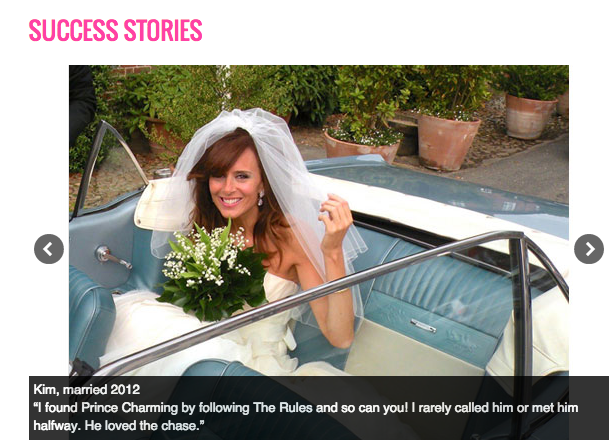
Could this woman be a feminist?
In 1995, a little book called The Rules became a phenomenon. Since then, its authors, Ellen Fein and Sherrie Schneider, have produced more books—including Not Your Mother’s Rules (2013)—while holding strong to their belief that men should chase women.
For many, this and other edicts at the heart of The Rules feel anti-women, anti-men or just plain antiquated. But—and I say this as an avowed feminist who has benefited from The Rules—I tend to disagree.
The Rules are less about positing women and men in a hierarchy than about acknowledging that there can be differences in how they approach romance and dating. Whether you think that's because of nature or the nurture of social expectations, it's hard to argue with the premise of at least some gender distinctions.
Recently, Fein and Schneider graciously agreed to talk with me not only about their work, but about feminist challenges to it. Below are their answers—and my translations of them. Perhaps it's time to look at this book in a new light.
A lot of people say The Rules is anti-feminist. Is that true?
No, we are feminists. We wrote our books and started our consultation company and think women and men should be paid equally. But we believe and accept that men and women are not romantically equal. We think love works best when a man pursues a woman. When a woman pursues a man, the challenge is gone and he doesn't treat her like a prize, and eventually he gets bored and dumps her for the girl he really likes and wants to chase. Or he stays with her, but she is forever insecure.
Feminist translation: OK, OK, so the "all men like a chase" and "girls are insecure" parts are pretty stereotype-steeped. But setting that aside, think of it this way: If you are awesome (and you are), people will be attracted to you. And sometimes, being coveted begets a good old-fashioned chase. Is that really such a bad thing?
Are men intimidated by strong women?
They don't like women who are aggressive or difficult. They like women who are a challenge, but easy to be with.
Feminist translation: Being strong and independent is not the same as being difficult, and we shouldn't conflate the two. And, yes, this applies to both genders.
What are the most important rules?
Don't initiate anything. Don't approach guys in person or text first or call or friend or message men on Facebook or write to them first on dating sites.
Feminist translation: I don't agree with The Rules' advocacy for a “fake it ‘till you make it” philosophy, but let's spin this idea on its head. It's true you shouldn't always be available—because you have your own damn life and other things to worry about. Not initiating isn't so much about playing coy, as it is about focusing on other aspects of a well-rounded existence.
Should you sleep with a guy on the first date?
We were on Bethenny and guys said they would never marry a girl who slept with them so fast because it reeks of desperation, showing low self-esteem and no boundaries. But we tell women who do have sex too soon to at least not act clingy or needy afterwards. The Rules are emotional, not just physical . . . so if you act emotionally cool, like you don't care and don't ask him where the relationship is going now that you have slept together, you might have a chance.
Feminist translation: Yes, the "clingy" and "needy" women tropes don't fit within feminist ideals, but I do agree with not compromising your physical and emotional boundaries for a man. Don’t sleep with a guy on a first date just because it’s what he wants.
Is chivalry dead?
No! Rules girls are getting chivalry. They are being courted, and asked out by Wednesday for Saturday. [One of the original rules was not to accept a date for Saturday night after Wednesday.]
Feminist translation: If you demand to be treated well, you will be treated well. If you act worthy of respect, you will get respect.
Obviously, a lot has changed since The Rules first came out, and in some ways, the book's dictums feel even more outdated and reductionist than ever. But when you distill it down, you'll see that the book is really about men being attracted to strong, independent women who know what they want and are willing to fight for it. In this sense, it's a good deal more feminist than it's sometimes given credit for.


